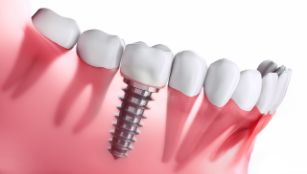
Unfortunately, healthcare is never completely guaranteed to be successful. But the good news is that some procedures, like dental implants, are successful most of the time (98% to be exact!) However, although the failure rate is low, it’s still well worth it to be aware of the most common types of implant failure and how you can prevent a dental implant emergency (or treat one should it arise). Along with basic care and maintenance on your part, these tips can help your implant last a lifetime!
Types of Dental Implant Emergencies
Here are some of the signs you might notice in an implant emergency:
- Severe pain in the area
- Your implant becomes loose
- You have swollen or bleeding gum tissue around your implant
- Chewing or biting down becomes painful
- The gums have receded or pulled back
How Can Implant Emergencies Be Treated?
If you notice any of the symptoms listed above, it’s a good idea to call a team of specialists. Depending on the situation, they may recommend treatment such as gum therapy, repairing the restoration attached to an implant (e.g. dental crown, bridge, etc), or a bone graft in the area. If it’s caught early enough, a “dental implant salvage” can often be done to save the implant and prevent failure altogether.
How Can You Prevent Implant Problems?
Here are some great ways to keep your implants healthy:
- Choose an experienced implant professional – It’s relatively rare, but sometimes a dentist makes an error that leads to failure. Ideally, you can see a specialist such as a periodontist or prosthodontist to make sure they have advanced training in implant dentistry.
- Quit Smoking – The success of an implant depends on how well it heals and integrates with the surrounding bone after it’s placed in the jaw. Smokers don’t heal as well as non-smokers, so they have a lower success rate of about 85%.
- Maintain healthy gums – Just as the pockets of gum tissue around natural teeth can collect bacteria and become infected, the tissue around implants can also become infected if it isn’t kept clean. That’s why it’s crucial to brush the area gently but thoroughly at least twice a day and floss at least once (oral irrigators are also helpful).
- Get regular dental care – Regular visits allow a dentist to closely monitor your implant and catch any potential problems early.
- Wear a nightguard if necessary – Many people clench and grind at night, which puts force on an implant that can cause it to become loose. A nightguard won’t stop you from grinding, but it can protect your implants (and natural teeth).
By following these guidelines, you’ll give yourself the absolute best chance of having successful implants for life!
About the Author
Dr. Richard Aguila is a board-certified periodontist and a graduate of the Medical University of South Carolina. He’s seen firsthand what a great option implants are after tooth loss and always provides maintenance tips to help his patients enjoy them for as long as possible. If you have any questions about a dental implant emergency, he can be reached via his website.
